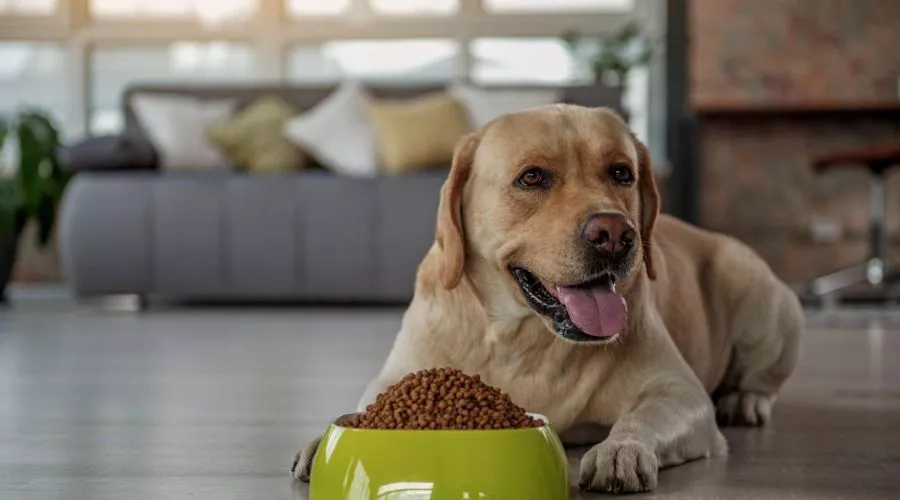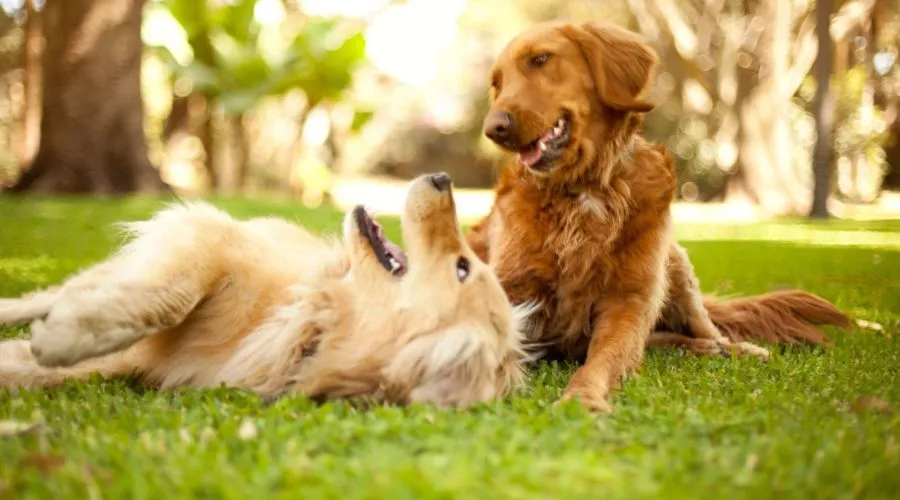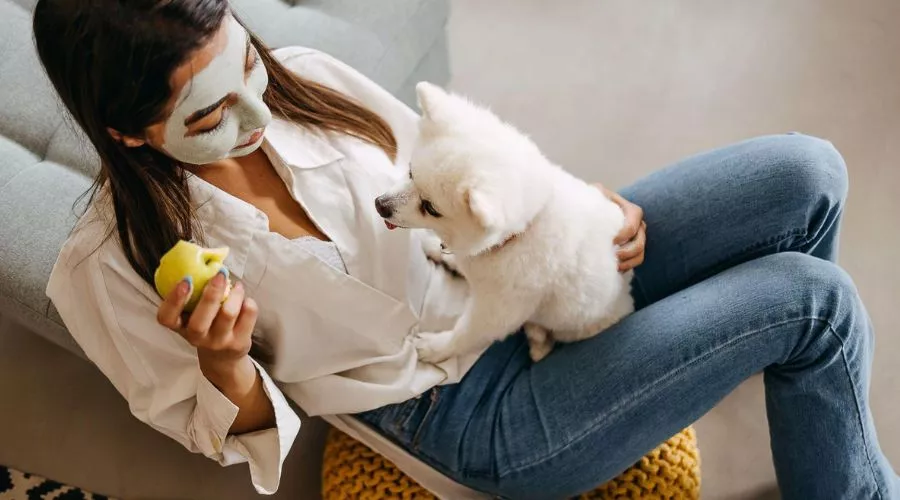Have you ever noticed your dog lying down to eat? It’s a behavior you may have seen in other dogs, but why do they do it?
Dogs lay down when eating for various reasons, from physical comfort to signaling submission to their human companions.
By understanding why your pup chooses to eat while lying, you can better understand their behavior and help them feel more secure.
From the physical benefits of lying down to the psychological implications of the behavior, there are many reasons why your dog might lie down to eat.
Physical benefits of lying down when eating

When dogs lie down to eat ↗, they have several physical benefits in mind. To start, it can allow them to eat more comfortably.
It’s easier to chew when the mouth is relaxed, so lying down can help dogs alleviate any issues they may have with their teeth or gums.
Even more, it can help address issues with digestion. If your pup has a sensitive stomach, it may lie down while eating to help regulate its digestive system and reduce feelings of bloating or nausea.
One more potential physical reason for this behavior is that it can help prevent choking. If your dog has food that is too large for its mouth, it could end up with food lodged in its throat.
Laying down while eating can help reduce this risk.
Psychological implications of the behavior

Beyond the physical reasons for this behavior, there are also many psychological reasons why your pup may choose to eat while lying down.
To start, eating while in a submissive position can be a way for your dog to show respect for you. By choosing to dine in this position, your dog may attempt to indicate that they acknowledge your place as their leader.
Another possible psychological reason is that it could be a way for your dog to show that they are feeling insecure.
Insecurities can stem from various factors, and if your dog is feeling anxious during mealtimes, it could be looking for a way to calm its nerves.
Finally, your dog may prefer to eat while on the ground because they find comfort in the position.
Some dogs may have a history of feeling anxious or vulnerable when eating in a more elevated position and may be more at ease when on the ground.
The role of dominance in eating

Some things need to be clarified about the role of dominance in eating. While some dogs may choose to eat in a submissive position because they feel submissive, others could do so because they are attempting to demonstrate dominance over their food.
Some dogs eat in a more upright position, so their head is higher than the bowl.
This can mean they are dominant over their food, meaning they want to be in charge of their meal.
This could signify that your pup is food-motivated, so you could use this behavior to give them positive reinforcement.
If your dog is eating in a submissive position, this could be a sign that you need to work to build their confidence.
Doing so can help address their insecurity and make them feel more secure around food.
How to support your dog in lying down to eat

If your pup chooses to eat while lying, you can support them by adjusting your behavior.
You can start by opting for a giant bowl. This can ensure that your dog’s head is above the bowl, which can help them to feel more in control over their meal.
You can also work to build your pup’s confidence and reduce their feelings of insecurity around eating.
You can do this by starting slow, giving your dog plenty of time to adjust to the new eating arrangement.
You can also feed your dog in a quiet, low-pressure environment, which can help to minimize distractions and calm their nerves.
Finally, you can work to build your pup’s confidence by rewarding them when they show signs of confidence around eating.
Signs of insecurity when eating

While it can be easier to recognize signs of insecurity when your dog is eating upright, you may still notice some symptoms when eating in a lying place.
You can look for signs like a lowered head, a tense or hunched posture, or avoiding eye contact.
If you notice any of these signs, it’s essential to work to reduce your pup’s feelings of insecurity.
You can start by taking steps to calm your pup down, such as using a quiet tone of voice and avoiding sudden movements.
Once your dog has calmed down, work to get them in a more confident headspace by rewarding them for showing signs of confidence.
What to do if your dog is showing signs of insecurity when eating
If your pup shows insecurity while eating, there may be better courses of action than trying to get them to eat upright.
Instead, you can try to work to calm your dog down and help them feel more comfortable in its eating environment.

Once your dog feels more secure, it can transition to eating while in an upright position if they choose.
You can start by taking the time to calm your pup down before meals.
You can do this by giving them time to relax, playing soft music to reduce disturbances, and even giving them a massage during mealtimes.
Another way to help your dog feel more comfortable eating is to reduce distractions.
You can do this by removing any potential distractions, such as your phone or other items that may draw your attention away from your pup.
Muffling any noises outside of your home can also be helpful when trying to reduce distractions for your dog.
The importance of understanding why your dog lays down to eat

Dogs are very expressive creatures, and there is a lot to understand about how they communicate with the world around them.
This is especially true regarding feeding and eating, as there are many reasons why your pup may choose to eat while in a lying position.
Understanding why your dog makes this choice can help you better support them during mealtime.
You can do this by considering all of the physical and psychological factors that could contribute to your pup’s eating behavior.
By paying attention to the different ways your dog eats, you can better understand their communication, and you can support them in feeling more confident and relaxed around mealtime.
FAQS
What should I do if my dog lays down to eat?
This can be a sign that your dog is not feeling well. If this is the case, you should contact your veterinarian as soon as possible. There are several reasons why a dog may lie down to eat; one of them could be that he is not feeling well. Knowing how to recognize the signs that your dog may be sick is essential so you can take him to the veterinarian if necessary.
If you suspect your dog is not feeling well, it is essential to take him to the veterinarian as soon as possible. There are several signs that your dog may be sick, including decreased appetite or eating more frequently than usual, weight loss, vomiting or diarrhea, coughing or sneezing, changes in behavior, limping or pain, redness or swelling in the eyes or ears, and changes in coat quality.
The best time to take your dog to the veterinarian is before he shows any signs of illness so that he can be treated early and effectively. If your dog lays down to eat, it’s essential to contact your veterinarian immediately so they can determine if there is a medical reason behind this behavior and determine the best treatment course.
Is it normal for a German Shepherd to eat lying down?
No, it is not normal for a German Shepherd to eat while lying down. However, it is typical for this breed of dog to eat in this position with their front paws resting on the ground.
This is because German Shepherds are very protective of their food bowls. They will do anything to protect their food, including placing their front paws on the bowl while eating.
While the dog may be eating, he remains vigilant so no one can come near his food.





![What Happens If A Dog Eats Edibles? What Should I Do [2023]](https://cutepetbox.com/wp-content/uploads/2022/11/What-Happens-If-A-Dog-Eats-Edibles-450x253.webp)
